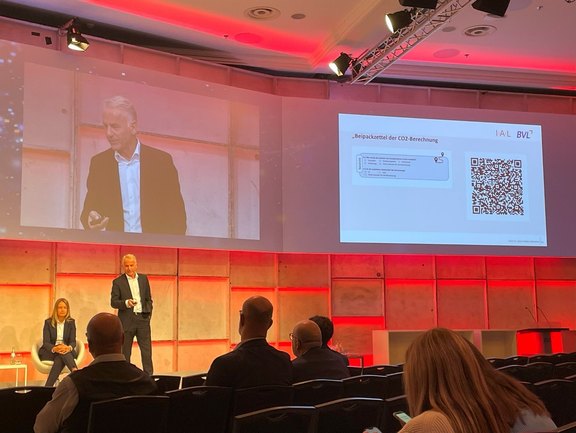In the session on "Must-Haves of Sustainable Logistics – From Emission Accounting to Sustainability Reporting to Circular Economy" on October 20, 2023, the following speakers shared insights from their respective companies and industries:
1. Carina Lebsack, Head of Corporate Sustainability at WÜRTH, discussed the concept of circular economy within the company. She emphasized the importance of sustainable corporate leadership, which includes measuring data, evaluating human factors, and promoting transformation. WÜRTH's approach involves assessing their current position, involving people through publications and global communication, and raising awareness in everyday places like coffee stations. Lebsack stressed the need to understand sustainability from the customer's perspective and the role of laws in providing data transparency. She highlighted that sustainability is an ongoing journey with a moving target, requiring a clear compass. Lebsack also called for a change in mindset, emphasizing that waste should be viewed as a valuable resource, not a disposable product. She recognized that human resistance is a significant challenge in sustainability and emphasized the importance of effective communication and understanding to overcome it.
2. Andrea Goeman, Senior Vice President Sustainability at JAS Worldwide, emphasized the importance of the materiality matrix as a foundation for sustainability reporting, highlighting its significance for financing and ESG reporting for banks. She referred to the upcoming CSRD (Corporate Sustainability Reporting Directive) starting next year and stressed the need for auditable data. Collaboration between the sustainability department and other departments to collect and prepare data was highlighted. It was also mentioned that strategic suppliers should be involved in the reporting process. In the discussion, it was emphasized that reporting should be integrated into financial reporting and function directly under the board. Starting and learning were recommended to become a reporting expert quickly.
3. Prof. Dr. Ulrich Müller-Steinfahrt from the Technical University Würzburg-Schweinfurt spoke about the importance of sustainable logistics and the critical role of clear calculations. Within the framework of the BVL's "Sustainable Design" theme, a "package insert for CO2 calculation" was developed, which he briefly presented to the audience and explained its structure. He mentioned that many logistics service providers are driving the transformation towards sustainability, with some already advanced, using the Sustainable Development Goals as a basis. Medium-sized and smaller logistics service providers are increasingly implementing individual sustainable measures and reporting on them. This process often begins with ecological sustainability and a focus on eco-friendly transportation logistics.
4. Jörg Mosolf, CEO of MOSOLF, discussed the challenges of electrification and the transition to renewable energy in the logistics sector. He emphasized that this process is cumbersome and lengthy, involving approvals, infrastructure connections, and high costs. However, the company has set clear goals for CO2 emissions (Scope 1-3) and is gradually working towards their implementation, including the use of "Hydrotreated Vegetable Oil" (HVO). Customer climate goals are considered, and there is comprehensive data collection and balancing within the truck fleet. Mosolf emphasized that the solution lies in the combination of hardware, software, and people's goodwill. Customers are likely to appreciate these efforts regardless of costs. However, he also pointed out challenges such as national laws for international freight transport and the need to choose the best available technology in an economic environment where trucks ultimately need to generate revenue.
In the ensuing discussion, strategies for positioning sustainability in economically challenging times were discussed. Participants emphasized that sustainability can offer long-term cost savings and growth opportunities. Innovation, corporate culture, and employee appreciation were also highlighted as essential aspects.
Here is the DLK program: https://www.bvl.de/files/1951/2142/3005/Deutscher_Logistik_Kongress_2023_Programm.pdf
The best part of in-person events is the exchange with other professionals! We look forward to learning from experienced supply chain experts and promoting knowledge sharing with fellow enthusiasts during our quarterly Supply Chain Learning Days 2024 in Hamburg/Munich. Kicking off the series is Roman Siegfanz, Plant Manager & Site Leader at Waygate Technologies in Hamburg on March 11, 2024, sharing insights and experiences on “Critical-Process-Assessment for S&OP - Best Practice".

